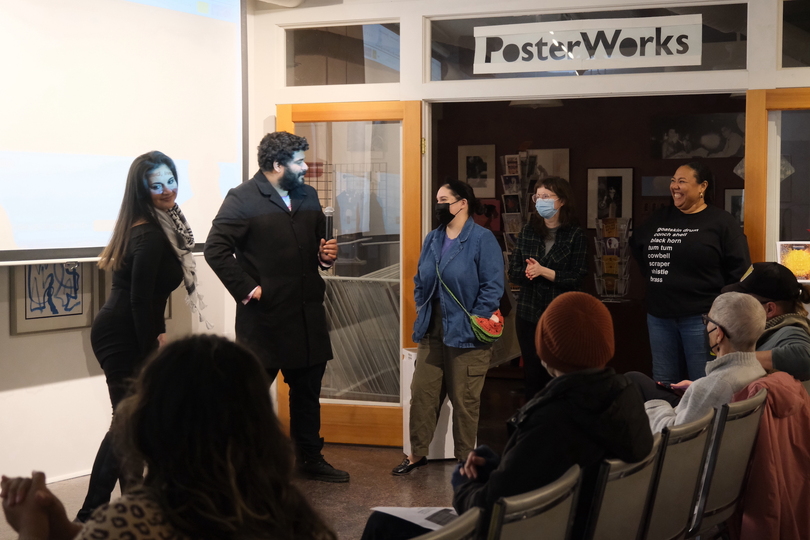ArtRage hosts film screenings to raise money for poet Mosab Abu Toha

Maxine Brackbill | Photo Editor
Put on by Sun Cinema and Engaged Humanities Network, ArtRage Gallery’s event on Monday raised over $600 for SU alum Mosab Abu Toha. Community members gathered to watch two films about the Israel-Hamas war and hear a reading of Abu Toha’s poetry.
Get the latest Syracuse news delivered right to your inbox.
Subscribe to our newsletter here.
On Monday night, Bahar Zaker brought her son to ArtRage, an art gallery located in the Hawley-Green neighborhood of Syracuse, for multiple film screenings and a poetry reading. The event, “YOU CAN ASK THE SUN,” was a fundraiser for Palestinian poet Mosab Abu Toha.
“I want to introduce my son to the situation,” Zaker said. “We’ve been having a lot more conversations lately about history and politics and things, so I just want him to see the different forms – whether it’s art or poetry or politics.”
The Washington Post reported on Nov. 20 that Israeli forces detained the poet. He was then reportedly released the next day and, on the same day, Syracuse University offered Abu Toha a visiting scholar faculty position. He is now in Cairo, Egypt, physically safe but in “mental anguish,” Abu Toha’s friend Natalie El-Eid said at the event. Using entrance fees, organizers Sun Cinema and the Engaged Humanities Network raised over $600 for Abu Toha.
“Ever since (the Israel-Hamas war) started, I’ve been looking for any forms of community gathering,” Zaker said. “The one thing that helps when we feel really powerless and when we feel very silenced is knowing that there’s a solidarity and there’s a community, and just knowing that other people care.”
During the event, El-Eid read three of Abu Toha’s poems to the audience: “Leaving a Childhood Behind,” “We Deserve a Better Death” and an additional poem about his mother.
Abu Toha won a 2022 Palestine Book Award and an American Book Award for his book, “Things You May Find Hidden in My Ear: Poems from Gaza,” a reflection on living and raising a family amid conflict. In April, the ArtRage gallery hosted Abu Toha to speak about his poetry.
“I came here to support Mosab (Abu Toha) because he is a beloved member of our community and a close friend,” El-Eid said. “He needs all the support he can get right now, and he needs for people to tell his story.”
More recently, in early November, The New Yorker published Abu Toha’s piece, “The Agony of Waiting for a Ceasefire That Never Comes,” a first-person narrative detailing Abu Toha’s experience living in Gaza. Abu Toha considers Gaza his “heart and home,” El-Eid said.
Saeed Taji Farouky’s “Strange Cities are Familiar” was the first film to illuminate the darkened art gallery. The film began with men singing in harmony, followed by a refugee father’s struggle to reach his ailing son in Palestine.
Directly after the first film, Nour Ouayda’s series of eight short clips, “one sea, 10 seas,” captured the audience’s attention. Video taken of the ocean off the coast of Beirut was a constant presence throughout the film. Using clips of crashing waves and no dialogue, Ouayda sometimes evoked “the invisible or inaudible, the emotions, landscapes and dread lodged in the memory itself,” wrote the Marseille International Film Festival about the film.
“I think a part of bearing witness is centering Palestinian stories,” said Natalie Gallagher, a Women and Gender Studies professor at SU. “Centering these voices while we’ve seen disinformation, but also learning these stories, giving space to these stories, bearing witness to not just the damage and destruction, but not losing sight.”
The event concluded with an opportunity for community members to engage in an open discussion. The audience was encouraged to discuss the media presented and their feelings surrounding them.
“I feel a little bit heavy,” Zaker said. “(Abu Toha’s) heart is heavy, understandably. My heart is heavy, too, of course, for all of the people who haven’t been able to make it out, and I don’t have too many words for it. Overall, just a sense of heaviness.”





